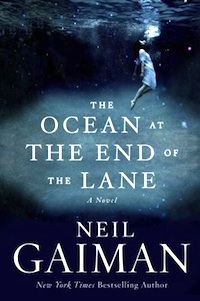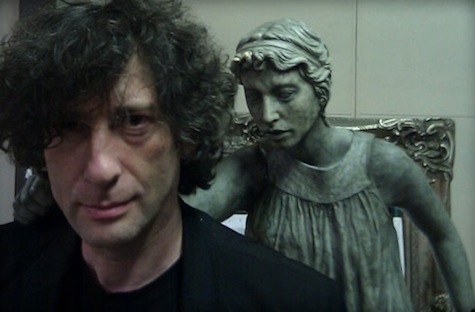“I’ve—I’ve never seen Doctor Who,” Erin Morgenstern confesses, about halfway through the interview.
The audience gasps.
Neil Gaiman is delighted.
“That was the best noise!” he says, “no disapproval, just a sense of ‘we can fix that for you—it’s called “Blink.” You just sit there.’ There is almost definitely someone out there with ‘Blink’ on their phone.”
Out of the packed audience at Symphony Space last night—and I know it was packed because I bought tickets for the last two seats in the house—there were assuredly people with Doctor Who on their phones. There were also people with TARDIS shirts, corsets, intricate footwear, every hair color you can imagine, and many, many copies of battered paperbacks and comics to be signed. It was the usual scene at a Gaiman signing, where people who have never met each other before are best friends by the time they get through the line; where an ecstatic voice screams “YES!” when Gaiman mentions that Snow Glass Apples is his favorite of the perfumes Black Phoenix Alchemy Labs have based on his work; where one of the audience-question cards has been adorned with a large, beautifully drawn thumbs up.
“Unless…” Gaiman said, turning the card upside down.
“Then we die,” Morgenstern replied.
“It’s a thumbs up!” the author of the card yelled, to an avalanche of applause.
Gaiman then instructed us to sit with Morgenstern during the signing line and “indoctrinate her into the mysteries.”
The crowd seems very please with this idea, but then they seem pleased with everything Neil Gaiman says or does.
This reading and interview, hosted by Symphony Space, was Neil Gaiman’s second New York stop during what is allegedly his final book signing tour. Erin Morgenstern, the author of The Night Circus, conducted a two-part interview with Gaiman, broken up by two short (wonderful) readings from The Ocean at the End of the Lane and an excellent audience Q&A.
 The Ocean at the End of the Lane is Gaiman’s latest book, his first for adults in nearly a decade, and the first novel he has written that mines his autobiography for material. It is set, more or less, on the lane where Gaiman spent his childhood, and deals with a fictional family, the Hempstocks, who first took up residence in Gaiman’s imagination when he was nine years old. They showed up soon after he found out that the farm at the end of his lane was mentioned in the Domesday Book. The farm had to have people living in it, the boy reasoned, so he thought up many generations of Hempstocks. Years later, various members made appearances in his work—Daisy Hempstock turned up in Stardust, and Liza Hempstock in The Graveyard Book. In Ocean, it is Lettie Hempstock who befriends the narrator and tries to protect him when a dark form of magic is unleashed in his village.
The Ocean at the End of the Lane is Gaiman’s latest book, his first for adults in nearly a decade, and the first novel he has written that mines his autobiography for material. It is set, more or less, on the lane where Gaiman spent his childhood, and deals with a fictional family, the Hempstocks, who first took up residence in Gaiman’s imagination when he was nine years old. They showed up soon after he found out that the farm at the end of his lane was mentioned in the Domesday Book. The farm had to have people living in it, the boy reasoned, so he thought up many generations of Hempstocks. Years later, various members made appearances in his work—Daisy Hempstock turned up in Stardust, and Liza Hempstock in The Graveyard Book. In Ocean, it is Lettie Hempstock who befriends the narrator and tries to protect him when a dark form of magic is unleashed in his village.
Gaiman said the process on this book was very different for him—where normally his work is more planned, this was something else:
“I started writing it for Amanda [musician Amanda Palmer, who has been married to Gaiman since 2011] because I missed her, but then it kept growing. I told my publishers there was a novella on the way, but then I did a word count at the end, and realized I just wrote a novel by accident! […] It wasn’t plotted. Things kept taking me by surprise. It’s not making things up, it’s getting into what did actually happen. E.L. Doctorow said writing a novel’s like driving from New York to Los Angeles in the dark, and only seeing as far as your headlights. This book was driving. In a thick fog. At night.” [Gaiman shook his head.] “With one headlight out.”
Morgenstern asked Gaiman if he realized how good the book was yet.
“I know…that people like it. With Ocean I’m seeing amazing reviews, because of the different ways people are approaching the book. One reviewer didn’t even talk about the plot, just abut how the book made him feel. It’s producing amazing reactions in people—it’s making people cry, and remember stuff they’d forgotten about being kids.”
Morgenstern followed up with a question about Gaiman’s own memories of childhood, and how he tried to work with them for the book.
“While I was writing, it was like I was there. There’s a scene where our hero has to climb down a drainpipe to escape, and I was talking to my sister, and she said, ‘you know, we’ve got a photo of you on that drainpipe…’ And that’s the back cover of the book now!”
Gaiman talked about the importance of food-memories and scent to creating the book’s world.
“I had two Jewish grandmas, with competing chicken soup recipes. I would go into their kitchens, and it was that sense that this thing was made especially for you, and you were loved. Children can take pleasure in small things, like ‘I’m sorry your best friend at school said you stink… do you want to get an ice cream?’ And you go and get the ice cream, and things are OK. At a certain point as an adult you cross a line… ‘I’m sorry you’re battling erectile dysfunction—let’s go get an ice cream?’ doesn’t really work anymore. So things are really dark and dangerous [in Ocean], but the food is great.”
The audience Q&A (conducted via index cards turned in at the beginning of the evening) was fantastic, with a great mix of silly questions—“What’s your favorite cheese?” “Wensleydale!”—and more intricate questions about the writing process, for instance a question about the differences between writing for books and for television: “If you’re writing a book, and you write a scene, and its good, and you really like it…it stays in the book.”
At one point a card came in that asked “Do you get inspiration from your children? Signed Maddie Gaiman, hee hee.” Gaiman replied that Maddie was the one who inspired Crazy Hair, while his son Mike provided the idea for The Day I Swapped my Dad for Two Goldfish when, being told to go to bed, two-year-old Mike said, “I wish I didn’t have a Dad! I wish I had…(small Michael Gaiman stands with fists clenched, thinking)…a goldfish!” To which the older Gaiman replied, “That’s brilliant!”
He also talked about his upcoming children’s book, Fortunately, the Milk, and mused about how great an Anansi Boys Broadway musical would be, and listed some of the authors that are inspiring him right now, including Diana Wynne Jones, Iain Banks, Jonathan Carroll, Gene Wolfe, and Alan Moore.
Finally, Gaiman took his seat at the signing table, and considering the line at Symphony Space, he may still be there.
Leah Schnelbach gets what everyone gets, she gets a lifetime. You can read her sporadic tweets here.










